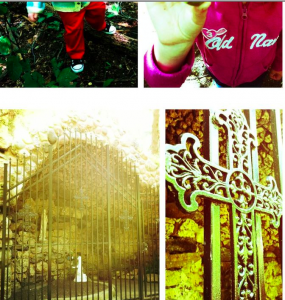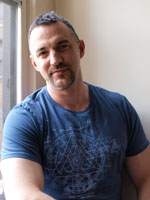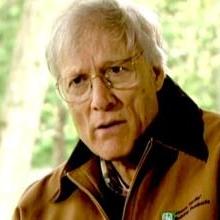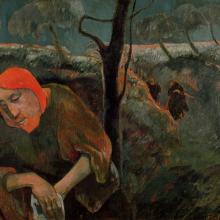passion
On Maundy Thursday of Holy Week, we remember how Jesus and his disciples celebrated the Passover meal, transforming it into what we now celebrate as communion. The word “maundy” originates in the Latin mandatum, in reference to the mandate Jesus gives his disciples that night: “A new commandment I give unto you that you love one another” (John 13:34). Just before the meal, Jesus engages in an act of loving service and humility: washing the disciple’s feet.
This selfless act contrasts sharply with the shameful spectacle that has dominated recent news: the indictment and arraignment of former President Donald Trump.
WALTER WINK IS known as a lectionary commentator with lucid biblical insight, a chronicler of nonviolent practice, a scholarly essayist, an arrestee in direct action, and one of the most important theologians of the millennium’s turn. He effectively named “the domination system” and its collusive principalities, opened up biblical interpretation to an integrated worldview, and brought the New Testament language of power back on the map of Christian social ethics.
Two years ago he crossed over to God, joining the ancestors and saints. His first two posthumous books have now appeared. They make for good companion volumes. Let me weave back and forth between the two. Walter Wink: Collected Readings is the anthology of his core work. Just Jesus: My Struggle to Become Human is a short autobiography. The second is the more remarkable—because it’s so rare that a world-class scripture scholar should tell his or her own story in relation to encounters with the biblical witness. And all the more so because it was a project undertaken after he was diagnosed with Lewy body dementia.
Given the dementia, the book itself is an effort of his “struggle to become human.” An early version of the manuscript included oral history and other sources narratively adapted to a first-person voice, but in the end his partner in all things, June Keener Wink, pressed for it to be pure Walter. No words not his own. His voice is easily recognized in these pages, though not always in the familiar crafted and noted style, rich in quotable one-liners. The jewels are here all right, but this text feels simpler, sparer, plainer. There are prayers and memories of one suffering the weight and creep of memory loss. Though it is a book he conceived and set to writing, June (aided by a sainted editor) lovingly completed the sculpture with autobiographical pieces, journal entries, prayers, dreams, and important portions of his final magisterial work, The Human Being: Jesus and the Enigma of the Son of the Man. The latter, also well represented in Collected Readings, frames the struggle (Jesus’, Walter’s, and our own) to become human.
New York Times op-ed columnist, David Brooks, responded, this week, to an intriguing article in the Washington Post about Jason Trigg, a recent MIT graduate, who chose a career on Wall Street as a way to redistribute wealth.
Trigg’s plan is simple. Make lots of money. Live simply. Give lots of money. It’s not far from John Wesley’s advice of, “Earn all you can. Give all you can. Save all you can.” Actually, it’s almost identical.
Brooks perceptively sees the dangers and pitfalls in the road ahead. Most specifically, wealth and the surrounding environment can have a corrosive effect, no matter good our intentions. Brooks writes:
…the brain is a malleable organ. Every time you do an activity, or have a thought, you are changing a piece of yourself into something slightly different than it was before. Every hour you spend with others, you become more like the people around you.
Gradually, you become a different person. If there is a large gap between your daily conduct and your core commitment, you will become more like your daily activities and less attached to your original commitment.
But, while I echo Brooks concern, I disagree with his ultimate conclusion. He goes on to argue that we should pursue careers that elicit passion (seeming to indicate that hedge funds couldn’t be a passion for some people) and that if we truly care about children in Africa, it’s best to go there – not Wall Street.
KRISTIN HART planned on moving to New York City to become an advertising agent with a sleek apartment and a stunning wardrobe. But one day all that changed. A humble missionary couple spoke at her church in Gainesville, Fla., about their experience fighting human trafficking in Asia, and after hearing the horrors of slavery, Hart knew she had to do something.
As she prepared to graduate from college in 2011, she applied for an internship with International Justice Mission (IJM), a Christian organization that rescues victims from trafficking and other violent oppression. A few months later, she found herself confronting the harshest cases of exploitation in south Asia.
“I saw people forced to work 18 hours a day, with their families taken from them,” Hart says. “I never imagined that humanity could be stripped from a person like that.”
ALL I EVER wanted to see was a movement of people to stop climate change, and now I've seen it. And it looks so beautiful. It's hometown heroes like our friends in D.C. who've been fighting coal plants, and far-flung heroes like those who've been bravely blocking the Keystone XL pipeline with their bodies in Texas. It's people who understand that the fight against fracking and coal ports and taking the tops off mountains is ultimately the fight for a living planet; it's people who have lived through Sandy and survived the drought, some of whom I got to go to jail with recently.
It's the students at 252 colleges who are now fighting the fossil fuel industry head on to force divestment of their school's stock—the biggest student movement in decades. It's all of you—you are the antibodies kicking in, as the planet tries to fight its fever.
We've waited a very long time to get started, I fear. We've already watched the Arctic melt; our colleagues in 191 countries tell us daily of some new drought or flood.
Because we've waited this long, the easiest answers are no longer enough; we're going to have to make tough decisions. Our theme has to be: When you're in a hole, stop digging. Above all stop the Keystone XL pipeline. The president can do it with a single stroke of his pen, and if he does he will become the first world leader to veto a big project because it's bad for the climate. That would be a legacy—and a signal to the rest of the world that we're serious about this fight. It's his test.
"EVEN IF I OWNED Picasso's 'Guernica,' I could not hang it on a wall in my house, and although I own a recording of the Solti Chicago Symphony performance of Stravinsky's 'Rite of Spring,' I play it only rarely. One cannot live every day on the boundary of human existence in the world, and yet it is to this boundary that one is constantly brought by the parables of Jesus." So wrote a great New Testament scholar, Norman Perrin, in his book Jesus and the Language of the Kingdom. I often think about his frankness as I prepare for the transition between Epiphany and Lent. We must soften and make bearable the intensity of the scriptural story to face it every week in church. We can't dive to the depths every single week, and we are right to keep our child-friendliness going.
But we need to risk depth and passion, or run the danger of making the gospel seem boring and predictable. Our churchly betrayal of God lies in our willingness to make the Word seem banal. So perhaps the thing we need to give up for Lent is our avoidance of depth. The scriptures this month will speak to us of faith as the experience of being stressed almost to a breaking point. They will plumb the depths of divine frustration and disappointment. We must clear a space for these wounding and thrilling themes and suspend our strategies for making worship palatable and safe.
Good Friday. Is this something we can understand? What makes it so "good?"
Sure, we have theologies about this moment in history. We have systematic notions about why who and what. We tell the story every year. Some traditions reenact the tale more than once a year. If you attend a church from one of the "liturgical" traditions, you here the story told during the Eucharist every Sunday. "Christ has died. Christ has risen. Christ will come again." It's the Paschal Mystery told again and again. I also know some baptist preachers who tell the story of the Passion of Christ every Sunday. It is the Gospel, after all. This story, the Passion, is The Gospel for many of us Christian preachers. And to not share the Passion is to not share The Gospel. If their sermons don't end with the proclamation of the sarcifice of Jesus, well, then it just isn't Church.
I'm still sharing that e-unspoken part of my faith again. This is not new. Nor is it unintegrated with the rest of my Christian spirituality. It's actually essential to it. So, in the spirit of clarity, I'm sharing this stuff with you.
I have no idea what Jesus meant by giving himself over like this. We read the scripture last night at the Maundy Thursday service at First Baptist. "Not my will but your's." Lord, have mercy. Someone asked the question as someone does every year, "Why would God want Jesus to die? If it's God's will...Why would God will this to happen?" I have some practiced answers. This year I offered them as I usually do.
"First, let me tell you what the tradition says..." I give a theological gloss and watch their eyes glaze over. Right. Of course. This isn't an answer any more than a stump speech is an indication of what will actually happen if one of these people in the news are elected to public office. So, I move on.

“When you remember me, it means that you have carried something of who I am with you, that I have left some mark of who I am on who you are. It means that you can summon me back to your mind even though countless years and miles may stand between us. It means that if we meet again, you will know me. It means that even after I die, you can still see my face and hear my voice and speak to me in your heart. For as long as you remember me, I am never entirely lost. When I'm feeling most ghost-like, it is your remembering me that helps remind me that I actually exist. When I'm feeling sad, it's my consolation. When I'm feeling happy, it's part of why I feel that way. If you forget me, one of the ways I remember who I am will be gone. If you forget, part of who I am will be gone. "Jesus, remember me when you come into your kingdom." the good thief said from his cross (Luke 23:42). There are perhaps no more human words in all of Scripture, no prayer we can pray so well."
~ Frederick Buechner

Religious procession on good Friday in Stuttgart-Bad Cannstatt, Germany. Via Wiki Commons (http://bit.ly/HUeRVg)
I’ve never liked the fact that we call the day on which we remember Jesus’ crucifixion “Good Friday.” What’s so good about it anyway? Personally I find the entirety of Holy Week – save for Easter – pretty depressing. Sure, the days are getting longer and things have started to grow all around us, but until Easter, the focus of the week is the suffering and death of an innocent man.
It turns out that, although plenty of folks have their own explanations, nobody actually knows why we call it Good Friday. I think the Germans are spot-on by calling it Karfreitag, which means “Suffering Friday.”
Figures the Germans would be more content to sit with suffering than the rest of us. They’re so serious! But I digress…
Lots of folks love preaching about the risen Christ on Easter Sunday without talking about what he went through to get there. It’s a bad habit we Protestants have, but plenty of us skip right over Maundy Thursday and Good Friday to Easter.
Holy Week and Jesus’ Ways for Peace
Palm Sunday/Passion Sunday and the week that follows — Holy Week — are times for Christians to remember and share the biblical stories of Jesus’ teachings and actions for peace. These stories encourage us to pray and work for peace, especially in light of those who are now threatening a new war with Iran. “Nine Years of War in Iraq: A Sojourners Retrospective” is a powerful reminder that churches need to do more.
Last year Sojourners posted a new hymn for Palm Sunday with peace themes, “Lord, What a Parade!” by Carolyn Winfrey Gillette.
This year the Black Mountain Presbyterian Church in North Carolina commissioned Carolyn to write a new hymn about Jesus’ nonviolent actions and compassion at the time of his arrest.
 "Jesus' spirituality was magnetic. Wherever he went, people gathered. His love, understanding and compassion toward humanity was overflowing and people traveled from afar to find solace in his teachings and to breathe life into their spiritual lives. His message of inclusiveness was seen as a threat by the religious leaders of his time -- whose very existence relied on a system of exclusivity."
"Jesus' spirituality was magnetic. Wherever he went, people gathered. His love, understanding and compassion toward humanity was overflowing and people traveled from afar to find solace in his teachings and to breathe life into their spiritual lives. His message of inclusiveness was seen as a threat by the religious leaders of his time -- whose very existence relied on a system of exclusivity."
[Editors' note: This post is part of a series over the last few weeks on youth homelessness. In the September/October issue of Sojourners magazine, the Ali Forney Center and the Gay and Lesbian Alliance Against Defamation (GLAAD) ran an ad to raise awareness of the serious problem of LGBT youth homelessness.]
homelessness.]
Fact 1) About 40 percent of the homeless youth in the United States identify as lesbian, gay, bisexual, or transgender.
Fact 2) One in four teens rejected by their families becomes homeless.
Fact 3) Parents who identify as strongly religious are three times more likely to reject their children.
Yet for Carl Siciliano, founder and president of the Ali Forney Center, these aren't just facts -- they are his daily life.
The Olympics is the greatest representation of national athletic pride. Somehow every couple of years, patriotism is met with a degree of innocence and acceptance that is too often forgotten in conflict and negotiation.
Five years ago, Afghanistan re-entered international basketball when the county's Olympic committee decided to draft a team for the 2006 Asian Games. A year later, the committee hired Mamo Rafiq, who was the first Afghan immigrant to play in the NCAA first for Idaho State and then UC Davis.
[Editors' note: During the season of Lent we will be posting excerpts from the Rediscovering Values Lenten Study Guide. We invite you to study God's word with us through these posts.]








